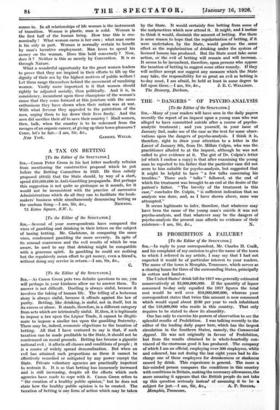THE “-DANGERS " OF PSYCHO-ANALYSIS • .
[To the Editor of the SPECTATOR.] Sra,=Many of your readers will have seen in the daily papers recently the report of an inquest upon a young man who was alleged to bitve committed suicide 'after a course of psycho- analytic treatment ; and you yourself, in your issue of. January 2nd, make use of the case as the text for some obser- vations upon the dangers of psycho-analysis. I think it is, therefore, right to draw your attention to a letter in the Lancet of January 9th, from Dr. Millais Culpin, who was the, practitioner alluded to at the inquest, although he was not called to give evidence at it. The gist of Dr. Culpin's letter (of which I enclose a copy) is that after examining the young man he reported to his father that the particular case did not seem to him suitable for psycho-analysis, but suggested that it might be helpful to have " a few talks concerning his troubles." Three such " talks " followed, at the end of which the treatment was brought to an end at the desire of the patient's father. " The brevity of the treatment in this case," concludes Dr. Culpin, " is sufficient indication that no analysis was done, and, as I have shown above, none was attempted."
It seems legitimate to infer, therefore, that whatever may have been the cause of the young man's suicide it was not psycho-analysis, and that whatever may be the dangerd of psycho-analysis the present case affords no evidence of their














































 Previous page
Previous page